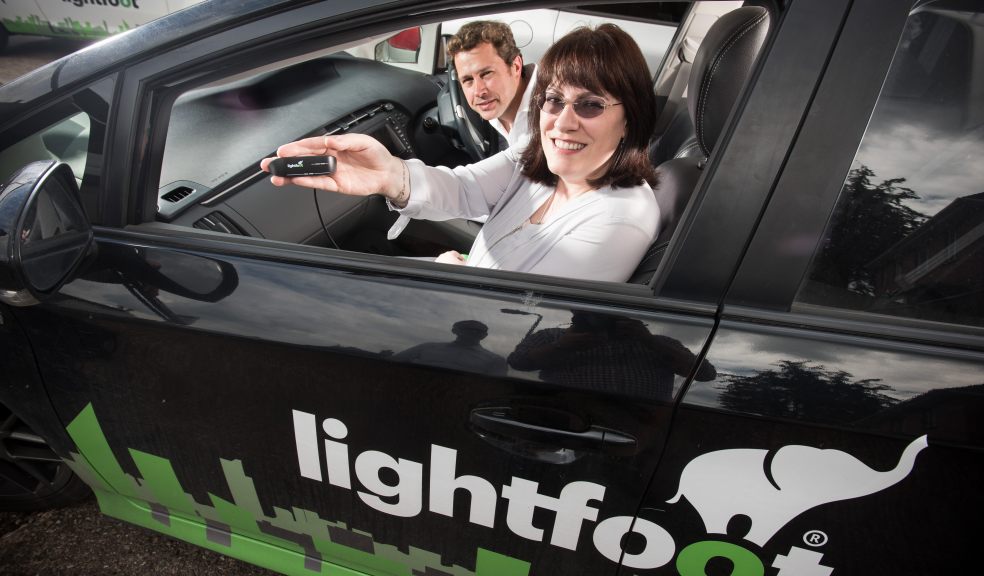
Pioneering Exeter technology is making our roads safer and cleaner
An Exeter-based motor vehicle firm is launching pioneering new technology to the consumer market which could reduce road traffic accidents by up to 60%.
Lightfoot is a driver improvement system originally developed to help businesses cut fuel costs and CO2 emissions but is already helping fleets cut their accident rates.
The Lightfoot team have now held talks with Exeter City Council, and the Exeter City Futures team is considering how to use the technology in some of the Council’s fleet vehicles.
The technology was developed by Lightfoot Managing Director Mark Roberts and his team of engineers in Exeter. The firm originally set out to make hybrid motors for vans to reduce fuel consumption and emissions, but have adapted over the years to meet the needs of the changing motor market.
Mark says: “If we can get the Lightfoot technology installed in a high proportion of cars within Exeter and the surrounding areas, it will have a massive impact on emissions within the city, as well as the road accident rate. We are really pleased to be in talks with the Council about how we can support them in rolling this out on fleet vehicles as the first step.”
The Lightfoot system was first used in fleet vehicles by firms such as South West Water, Autoglass and Vospers, who, says Mark, found that were not only saving up to 15% on fuel costs but that their drivers were up to 60% less likely to have an ‘at-fault’ accident as a result of their improved driving.
Mark said: “The initial results from our hybrid vans were not always what we expected and when we looked into it we discovered that people’s individual driving techniques were reducing the impact. That’s when we decided to team up with the University of Bath to research the psychology behind behaviour change and how we could teach people to drive more efficiently.
He continued: “We came up with a method that uses simple techniques and a traffic light warning system that allows drivers to improve their behaviour before getting an official warning. When we installed this version on company vehicles, it did start to improve fuel efficiency and reduce emissions, but commercial fleet owners were also surprised to see that it had reduced the risk of road accidents by up to 60% as a result of the more considered driving styles.”
Such was the success with commercial vehicles Lightfoot has now started a trial to see if the technology will be as effective with consumers. One hundred drivers in Exeter have just begun testing the system and will be competing in leagues against friends and colleagues to see if it has the same effect as it has in the business world.
Initial results are extremely encouraging – in the first week the percentage of drivers on the trial who achieved what Lightfoot define as the Elite Driver level was 54% when only 3% were achieving this before their Lightfoot devices went live. Participants have also taken to social media to detail their fuel efficiency savings, with improvements of 15-30% being reported.
Mark said: “People in Exeter are trialling the system for free, to see if it works as well for everyday drivers. Exeter is the perfect location to try out this new technology as the city is aspiring to lead the way in terms of sustainability and people are open minded and enthusiastic about new technology and innovation.
“We could have trialled it anywhere and have had interest from other councils, but Exeter is at the heart of our business and we have a strong reputation for being a leading city in terms of innovation. We decided to move our business to Exeter in 2010, to be in the centre of a forward-thinking and fast-paced environment where people are working together to make the city the absolute best it can be.”
The trial forms part of the work of Exeter City Futures, an initiative backed by the City Council to make Exeter cleaner, greener and smarter in the way that it functions.
Catherine Hill, Business & Commercial Partnerships Manager and Programme Manager of Exeter City Futures, said: “We are looking into installing Lightfoot technology into Council fleet vehicles and some of our staff are part of the pilot, having the gadget in their personal vehicles. Some have noticed the difference in their driving already, accelerating less harshly and being calmer drivers. We are excited about how this pilot could improve the health of Exeter residents, workers and visitors, one of the aims of the Exeter City Futures programme.”
Lightfoot’s employees are also using the technology to improve their daily commute. Mark said: “The majority of our staff live in Exeter and are already seeing huge benefits, from saving money on fuel to more pleasant journeys. We also have a team league table to find out who the best driver is each week, which brings with it its own rewards. Our team believe in this technology and that it can make a difference. We have such a vast amount of experience and a varied workforce at Lightfoot, we have even been able to attract talent from further afield to move to Exeter to be part of our team. Exeter has so much to offer its residents, from a great work-life balance to great opportunities and a forward-thinking council.”
The Lightfoot system is endorsed by insurance companies including Allianz Insurance because they recognise it results in fewer accidents and claims.
For more information about Lightfoot, visit www.lightfoot.co.uk or follow @lightfoot_UK. For more information about relocating a business to Exeter, visit www.investinexeter.co.uk or follow @investinExeter




















